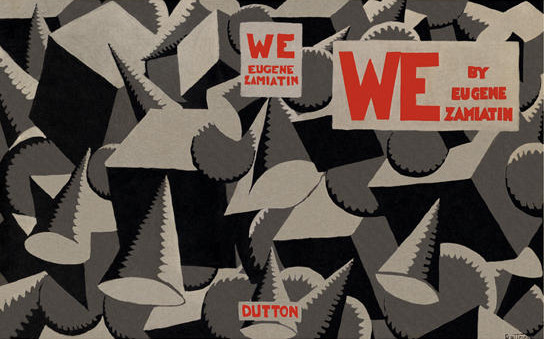Julia Vaingurt: Wonderlands of the Avant-Garde: Technology and the Arts in Russia of the 1920s (2013)
Filed under book | Tags: · 1920s, aesthetics, architecture, art, art history, avant-garde, biomechanics, body, cinema, communism, constructivism, design, literature, machine, politics, russia, science fiction, sexuality, socialism, soviet union, technē, technology, theatre

“In postrevolutionary Russia, as the Soviet government was initiating a program of rapid industrialization, avant-garde artists declared their intent to serve the nascent state and to transform life in accordance with their aesthetic designs. In spite of their professed utilitarianism, however, most avant-gardists created works that can hardly be regarded as practical instruments of societal transformation. Exploring this paradox, Vaingurt claims that the artists’ investment of technology with aesthetics prevented their creations from being fully conscripted into the arsenal of political hegemony. The purposes of avant-garde technologies, she contends, are contemplative rather than constructive. Looking at Meyerhold’s theater, Tatlin’s and Khlebnikov’s architectural designs, Mayakovsky’s writings, and other works from the period, Vaingurt offers an innovative reading of an exceptionally complex moment in the formation of Soviet culture.”
Publisher Northwestern University Press, 2013
SRLT series
ISBN 0810128942, 9780810128941
322 pages
via Sorin
Review: Boris Dralyuk (NEP, 2013), Tim Harte (Slavic Review, 2014).
PDF (updated on 2022-11-12)
See also the science-fiction film Aelita, Queen of Mars, dir. Yakov Protazanov, 1924, 111 min, based on Tolstoy’s novel.
Comments (2)Yevgeny Zamyatin: We (1924–) [EN, DE, CZ, FR, ES, YU, SK, RU, CR, TR, GR]
Filed under fiction | Tags: · machine, science fiction, technology

“Shortly after the nascent Soviet government consolidated its power and launched a program of rapid industrialization, Yevgeny Zamyatin’s novel We (written 1920-21) scandalously questioned the validity of techno-scientific instrumentality, a central principle of societal transformation in Soviet Russia. The first major work of fiction to be censored by the new regime, the novel was smuggled to the West, translated into English, and became an ur-text of twentieth-century science fiction, in particular standing, alongside Aldous Huxley’s Brave New World and George Orwell’s 1984, as progenitor of a new anti-utopian subgenre warning of the mass cultural homogenization of humanity in the name of progress. Set in a future totalitarian OneState, the novel records the internal conflict and gradual self-awakening of the initially robotlike rocket engineer D-503, torn between his faith in state orthodoxy and yearning for perfect order, on the one hand, and, on the other, his growing awareness of his own disorderly, irrepressible, idiosyncratic subjectivity. The catalyst of this subversive development is the act of writing—paradoxical insofar as this act functions, in the totalitarian system envisioned by the novel, as one of the instruments of the state’s all-pervasive control. […]
Zamyatin’s anti-utopian novel establishes a counterpoint to the purely instrumental technologies conceived by technophiles and tech-nophobes alike insofar as the author consistently deprives technology of its defining characteristic in Industrial Age culture, namely, its functionality. In its place, We imbues technology with various human traits, transforming machines into great vehicles for reflection. As opposed to the aspirations of Soviet ‘new men’ to become machines, Zamyatin’s text features ‘reflexive technologies’ in which pure instrumentality is marred by human idiosyncrasies. In this effort to aesthetically reassess technological potential, to view technology as a medium for contemplation rather than societal change, Zamyatin’s We takes its place within a canon of artistic works that responded to technological advancement with an urge not to exploit but to explore.” (from an essay by Julia Vaingurt, 2012)
The first unabridged Russian edition was published by Chekhov Publishing House in New York, 1952.
English edition
Translated and with a Foreword by Gregory Zilboorg
Introduction by Peter Rudy
Preface by Marc Slonim
Publisher E. P. Dutton, New York, 1924
Reprint, 1952
SBN 0525470395
218 pages
Wikipedia (EN)
We (English, trans. Gregory Zilboorg, 1924/1952)
Wir (German, trans. Gisela Drohla, 1958, EPUB)
My (Czech, trans. Vlasta and Jaroslav Tafels, 6th ed., 1969/2006)
Nous autres (French, trans. B. Cauvet-Duhamel, 1971)
We (English, trans. Mirra Ginsburg, 1972, 21 MB, no OCR)
Nosotros (Spanish, trans. Juan Benusiglio, 1972, unpag., Archive.org)
Mi (Serbo-Croatian, trans. Mira Lalić, 1978)
My (Slovak, trans. Naďa Szabová, 1990)
We (English, trans. Clarence Brown, 1993, MOBI), Audio book (torrent)
Мы (Russian, 2003, pp 211-368, DJVU)
Mi (Croatian, trans. Rafaela Božić Šejić, 2003)
We (English, 2006, trans. Natasha Randall, forew. Bruce Sterling, EPUB, added on 2019-1-16)
Biz (Turkish, trans. Algan Sezgintüredi, 2009)
Εμείς (Greek, trans. Ειρήνη Κουσκουμβεκάκη, 2011), HTML
Peter Swirski (ed.): The Art and Science of Stanislaw Lem (2006)
Filed under book | Tags: · artificial intelligence, film, literary criticism, literature, robots, science fiction, technology, technoscience

“The Polish science fiction writer Stanislaw Lem, whose works include Return from the Stars, The Cyberiad, A Perfect Vacuum, and Solaris, has been hailed as a “literary Einstein” and a science-fiction Bach. The Art and Science of Stanislaw Lem provides an inter-disciplinary analysis of his influence on Western culture and the creative partnering of art and science in his fiction and futorology by American and European scholars who have defined Lem scholarship.
Rather than analyzing Lem solely as a science fiction writer, the contributors examine the larger themes in his work, such as social engineering and human violence, agency and consciousness, Freudianism and the creative process, evolution and the philosophy of the future, virtual reality and epistemological illusion, and science fiction and socio-cultural policy.
This unique collection also includes “Smart Robots,” a previously unpublished essay by Lem.”
Contributors include Peter Butko, Istvan Csicsery-Ronay Jr, Katherine Hayles, Jerzy Jarzebski, Michael Kandel, Stanislaw Lem, Paisley Livingston, Krzysztof Loska, and Peter Swirski.
Publisher McGill-Queen’s University Press, 2006
ISBN 0773575073, 9780773575073
208 pages
PDF (updated on 2014-12-29)
Comment (0)
